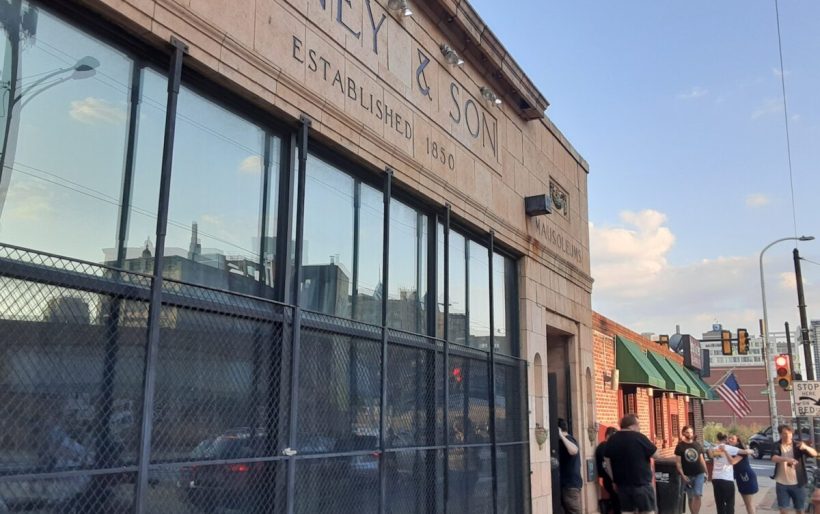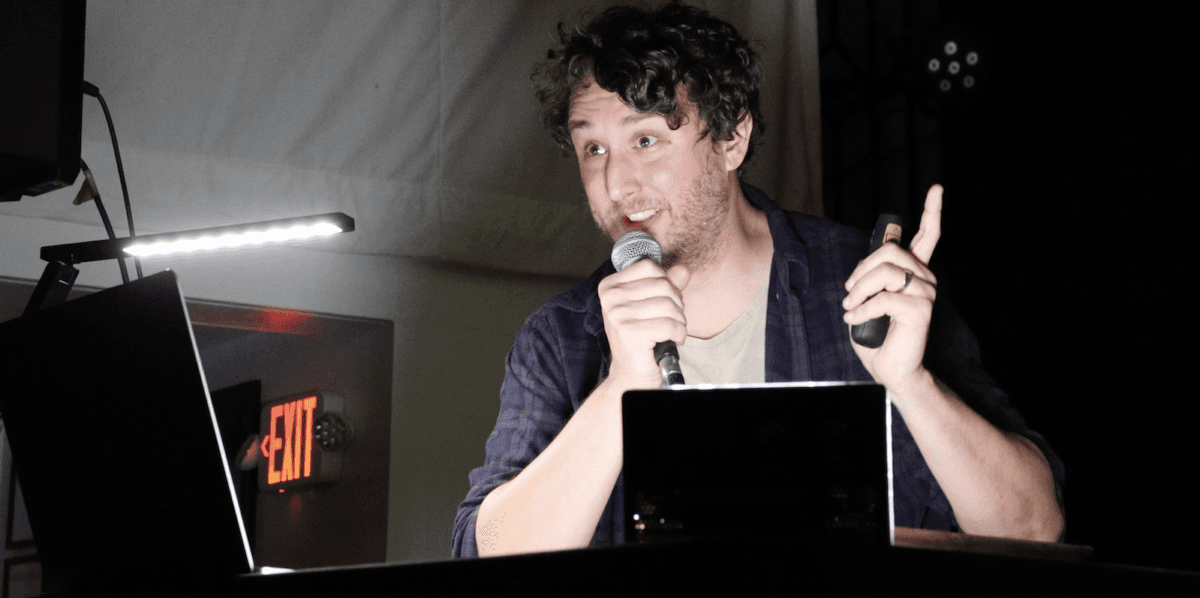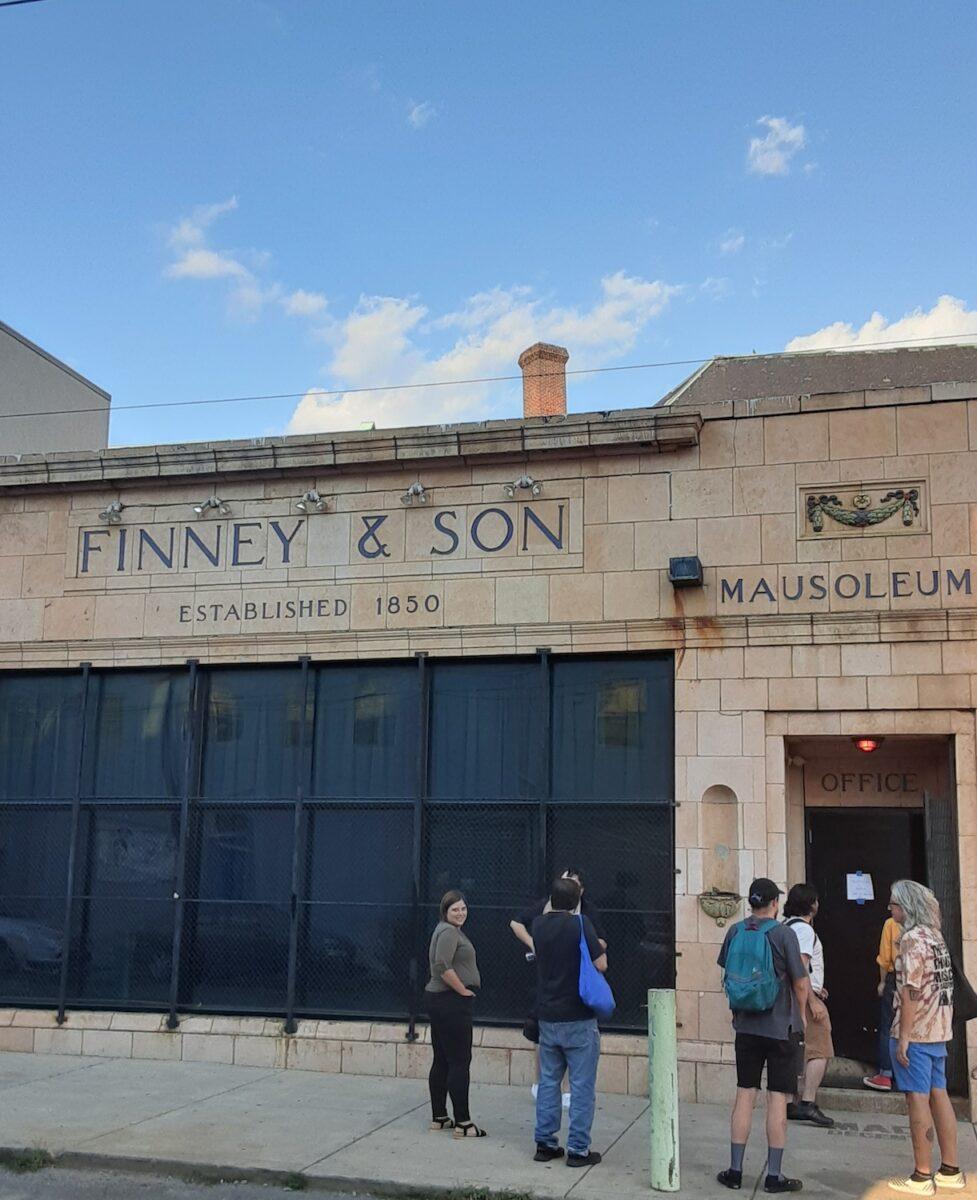
PhilaMOCA | photo by Sean Fennell
Long Live PhilaMOCA! On re-opening weekend, Callowhill arts space celebrates the community that kept it alive
PhilaMOCA’s death and resurrection had all the makings of a classic horror movie, one that would have easily graced the Callowhill venue’s storied screen in years past. There’s the creeping evil below the surface. Rapid Gentrification! The seemingly normal night where all goes wrong. No, not the Philadelphia Department Licenses and Inspection!! The realization of the true battles to be fought. Renovations! Applications! Hearings! The final boss that emerges through the (drug)smoke, refusing to be taken down, bloodthirsty and unrelenting. The local! Neighborhood! Zoning! Board! AHHH!!!! And that’s all not to mention COVID, which I don’t have to tell you was a horror story all its own.
Considering all this, you couldn’t have blamed PhilaMOCA owner and operator Eric Bresler if he spent the entirety of this weekend’s two feature-length presentations wallowing in the heartaches, setbacks, gripes and general BS that have made up the last nearly two years of his life. But this was something different.
From the moment the first guests started to arrive on Friday night, you got the sense that the word “presentation” didn’t quite capture what was going on. Bresler may have been the one welcoming people back, the one on stage throughout the night, but this was more reunion than recitation, a night where everyone could get together and celebrate not only PhilaMOCA’s anticipated reopening, but PhilaMOCA as a whole and what it means to the community it serves.
The presentation opened with a brief history of both the venue and Bresler’s time in the Philly music scene, recapping his years spent in the Drexel house show circuit before taking over PhilaMOCA back in 2014. From there Bresler summarized, almost reluctantly, the hours of manpower, miles of red tape, and what one can only imagine was approximately six million emails that marked the venue’s struggles to reopen. But it was when the presentation shifted from those more nuts and bolts details to focus on PhilaMOCA’s place in the Philadelphia art, music and film landscape that Bresler truly seemed at home.

“I felt like Philly was missing a vital vein in its creative body,” says Charles St. John Smith III, Bresler’s lifelong friend, a photographer, and a longtime volunteer at PhilaMOCA. It’s a sentiment backed up during the presentation’s exhaustive list of performers, guests and moments from the venue’s history. You could feel a kind of high school reunion camaraderie buzz through the crowd as Bresler rattled off names like Chris Elliot, Jan Terri, Neil Breen, of course, David Lynch, whose film Eraserhead serves as an almost mascot for the venue, culminating in a yearly Eraserhood Forever celebration.
It was here Bresler was able to highlight one of PhilaMOCA’s more unique programs, the Psychotronic Film Society, a group who meets once a month to screen “cult/weirdo/trash” films from every corner of the globe, with each member of the society getting their chance to screen the movie of their choice. There are dozens of venues, galleries, movie houses, and art spaces around Philadelphia, but none that truly serves the specific audience calls PhilaMOCA home. It was something Bresler took into account as he worked toward reopening. “I had a lot of time to think during the pandemic and was considering whether it was time to rethink or re-envision the room,” said Bresler during our conversation a few days before this weekend’s presentation. “What I settled on is to keep everything as it was, because the majority of what we showcase are things you don’t see in other spaces in the city.”
I don’t want to speak for everyone, but it’s hard to argue he made the wrong decision in this regard, a notion backed-up by the overwhelming support Bresler and the venue received during their renovation project. Only a space cherished and loved by its patrons would receive the kinds of letters of support Bresler read through on stage Friday night, fighting back tears as fans expounded on PhilaMOCA’s place in their lives, expressing the importance of spaces that can make you feel seen in such a specific and accepting way. The letters, and the success of the initial GoFundMe, seemed to give Bresler the necessary motivation to continue fighting for PhilaMOCA’s existence. “That was the first time I understood what this place means to people,” said Bresler. “People were willing to give tens of thousands of dollars to keep us alive, so we must have been doing something right over the years.”
As much as PhilaMOCA means to the dozens of fans in attendance this weekend, it means even more to Bresler, whose dedication and perseverance made this weekend, and hundreds of weekends past and future, truly possible. As the evening came to a close, you couldn’t help but notice the amiable smile pinned to Bresler’s face, his eyes reflecting back the dozens of times he might have feared a night like this would never happen again and the sheer joy in the realization that, finally, things might be on their way back to normal. The zombies are dead, the evil is thwarted, the oozing blood has dried, long live PhilaMOCA.
